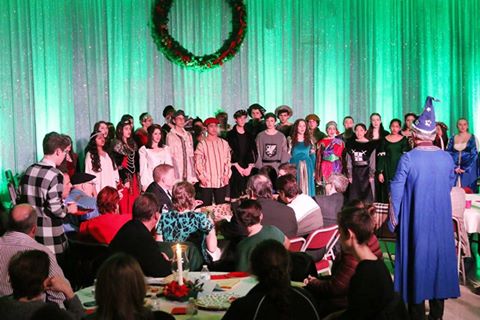Madrigals: A Holiday Tradition for the Ages
December 15, 2018
Kings and queens in trailing velvet robes, valiant knights jousting atop horses, a princess in disguise, and a magnificent holiday feast: is this the famed dinner theater show Medieval Times, or perhaps a Renaissance Faire? In fact, it’s neither of those things: all of the aforementioned spectacles can be found at Tenafly High School’s very own annual Madrigal Dinner, which will be taking place this Saturday, December 12.
THS’s Madrigal Dinner is a multifaceted holiday theater performance composed of a short, usually farcical play set in the medieval court of England’s King Henry; traditional madrigals, or songs composed in the Middle Ages, which are organized logically to fit with the context of the play; and a small dinner provided for those who attend the show. The dinner takes place in the THS cafeteria, which, on the day of the performance, is bedecked in finery to resemble less a typical high school lunchroom than a royal court.
The Madrigal Dinner at THS has been a tradition for thirty-five years, but it’s changed quite dramatically since its founding. According to Mr. Millar, who currently directs the Madrigal Dinner, “Mrs. Susan Tall started Madrigals around 1982. Back then, she did everything herself: writing the scripts, teaching the music, and staging the show. When I was hired in 2003, Mrs. Tall gave the Madrigals production over to me. In the beginning, I followed the same formula she used, but as the years went by, I made changes to the show. There used to be an actual full course dinner cooked by Pomptonian, two nights of performances—Friday and Saturday night—and professional entertainers, such as jugglers and lute players, hired to perform.” Today, however, the fare at the Madrigal dinner consists largely of hors d’oeuvres and small desserts, the show is a one-night-only occurrence, and any impressive feats of athleticism or music are all accomplished by Tenafly students. Perhaps predictably, the madrigals themselves have changed as well. While some madrigals, such as “Fair Phyllis” and “Wassail,” have been sung annually since the time of Mrs. Tall, others are no longer sung or only sung occasionally. The plays’ plots also change, though there are always a few constants, such as the setting being the court of King Henry and the court jester being the protagonist of the show.
Last year’s Madrigal Dinner was a unique occurrence; for the first time in recorded THS history, there were no boys involved in the performance. As a result, last year’s Madrigal singers were known as the MadriGALS, and the traditional show structure was forgone in favor of a cabaret format. However, while the dinner was still fairly successful, “I think the kids and the audience enjoy it more when there’s an actual show with a narrative and scenes, rather than just a variety show,” stated Mr. Millar. As such, this year, part of the honors choir curriculum for all male singers is involvement in Madrigals, which guarantees that at least some boys will participate in the performance.
Perhaps one of the most attractive aspects of Madrigals for many of its participants is the extravagant costumes which performers get to wear, many of which are made with delicate lace, lush velvet, or beautiful embroidery. The first Madrigals costumes, in the time of Mrs. Tall, were provided by the parents of the performers, who largely designed and sewed together the costumes themselves. Today, if a new costume is needed, it will rarely, if ever, be made by a parent; it’s much more likely that either Mr. Millar or the performer themselves will simply order it online. Stylistically, however, the costumes haven’t changed dramatically, and the old handmade costumes are treated delicately so they can last for years to come. The stage manager of Madrigals, Emily Kwen (’20), is tasked with assigning costumes to performers and ensuring that all costumes are returned in good condition. When assigning costumes, she took many factors into consideration, including the sizes of the costumes, the roles of the performers in the play, and seniority—traditionally, seniors will get to choose a costume first, followed by juniors, then sophomores, and finally freshmen.
Another potential reason to join Madrigals is the opportunity to participate in caroling, which has been an aspect of Madrigals ever since its creation: every year, during the last two days before the start of the holiday break, the Madrigal Singers travel around the Tenafly School District to perform carols for students. “It might seem pretty remarkable that the high school lets as many as thirty-five students miss class for a day and a half to go caroling around the district, but everyone also really loves it,” stated Mr. Millar.
Most importantly, Madrigals is a fantastically fun opportunity for newcomers to theater to become involved in the performing arts. “People don’t get cut from Madrigals, so it’s a “way in,” especially if you’re a freshman or you really wanted to be in the musical or play and didn’t get cast,” stated Mr. Millar. “Madrigals is a really great place to start, and not to mention, Mr. Ahn-Cooper and I get to see people before the auditions for the next show.” Above all, Madrigals is, as Kwen stated, “very fun and always brings a lot of people together”—and isn’t that the true spirit of the holidays?
You can buy tickets for this year’s Madrigal Dinner at this link.

















































































































































